Japanese Law: Administrative Law and Regulation Policy Analysis
VerifiedAdded on 2023/01/10
|10
|3644
|33
Report
AI Summary
This report provides a comprehensive analysis of Japanese Administrative Law, focusing on the legal framework governing administrative actions and regulatory policies. It delves into the powers of the Tokyo governor during states of emergency, particularly concerning the closure of businesses like movie theaters and pachinko parlors during the COVID-19 pandemic. The report examines the legal basis for such actions, including the Administrative Procedure Act of 1993 and the role of administrative guidance. It explores the challenges faced by businesses in response to the governor's requests, the potential for legal challenges, and the limitations on the governor's authority. The analysis covers the interplay between national and local government powers, the application of emergency powers, and the principles of administrative law in Japan, including the balance between individual rights and state interests. The report also discusses the impact of these regulations on citizens and businesses, including potential compensation and the role of the judiciary in resolving disputes. The report also examines the impact of the governor's decisions on duties and roles of citizens, restrictions on businesses and the validity of decisions. Furthermore, the report also focuses on the roles and responsibilities of administrative bodies and the legal implications of the decisions made by the Governor of Tokyo.
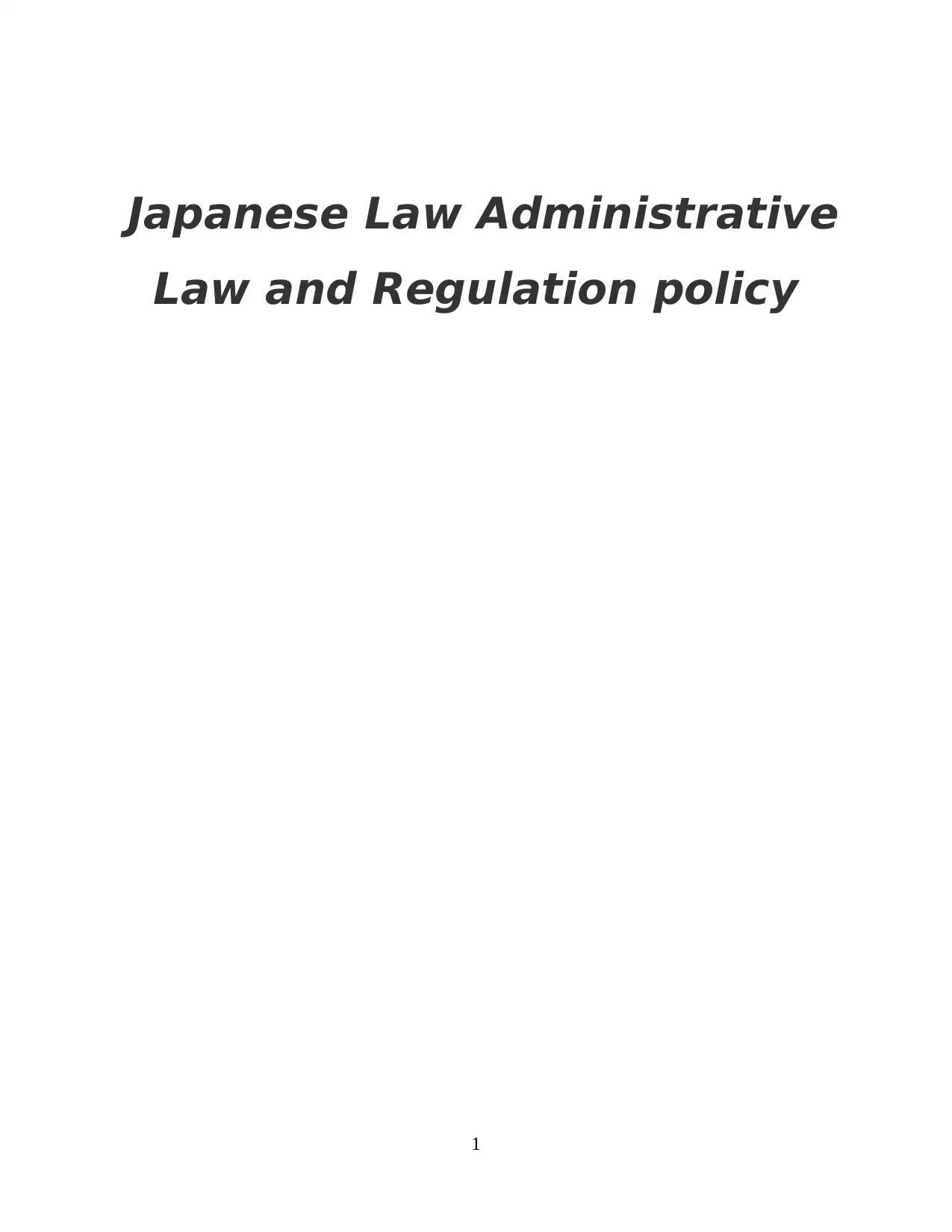
Japanese Law Administrative
Law and Regulation policy
1
Law and Regulation policy
1
Paraphrase This Document
Need a fresh take? Get an instant paraphrase of this document with our AI Paraphraser
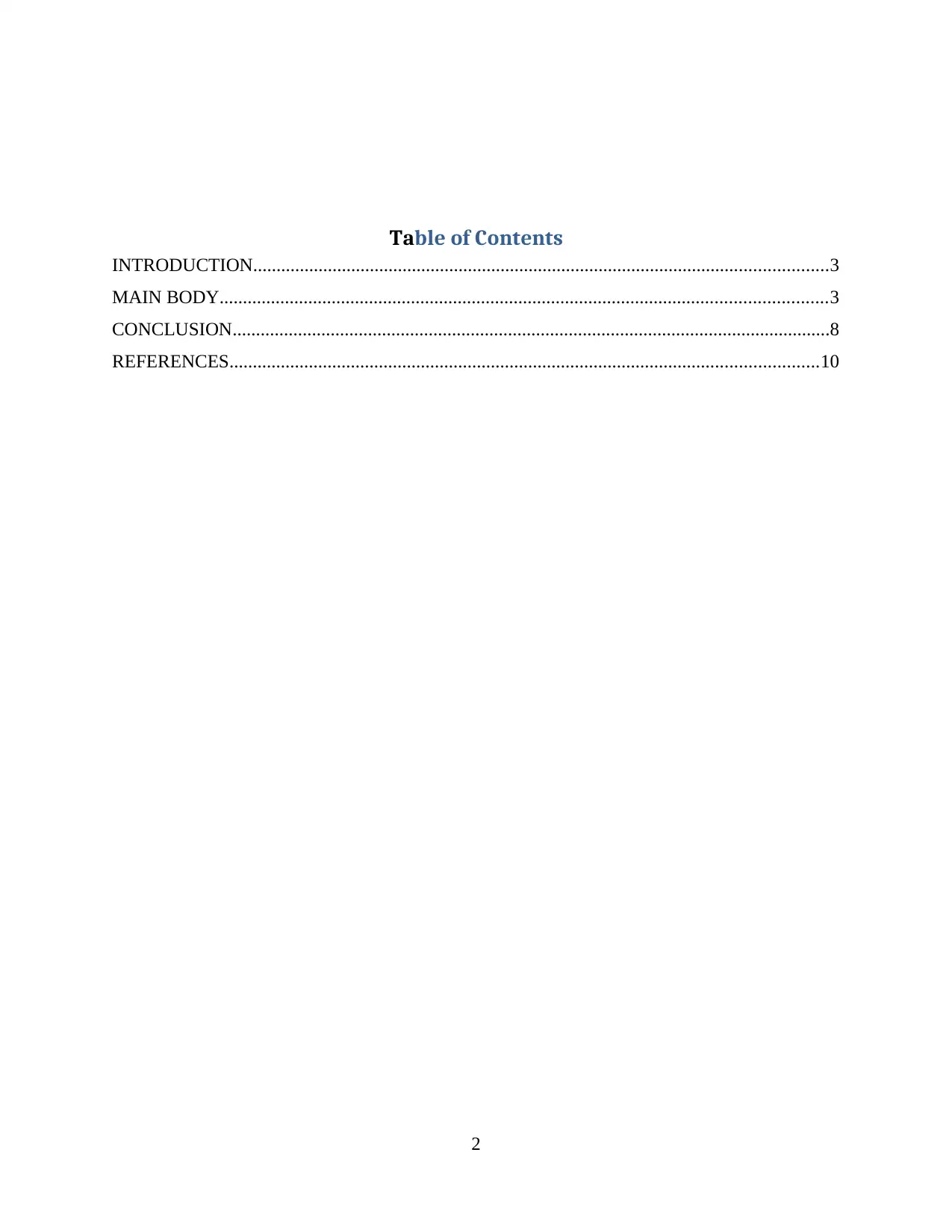
Table of Contents
INTRODUCTION...........................................................................................................................3
MAIN BODY..................................................................................................................................3
CONCLUSION................................................................................................................................8
REFERENCES..............................................................................................................................10
2
INTRODUCTION...........................................................................................................................3
MAIN BODY..................................................................................................................................3
CONCLUSION................................................................................................................................8
REFERENCES..............................................................................................................................10
2
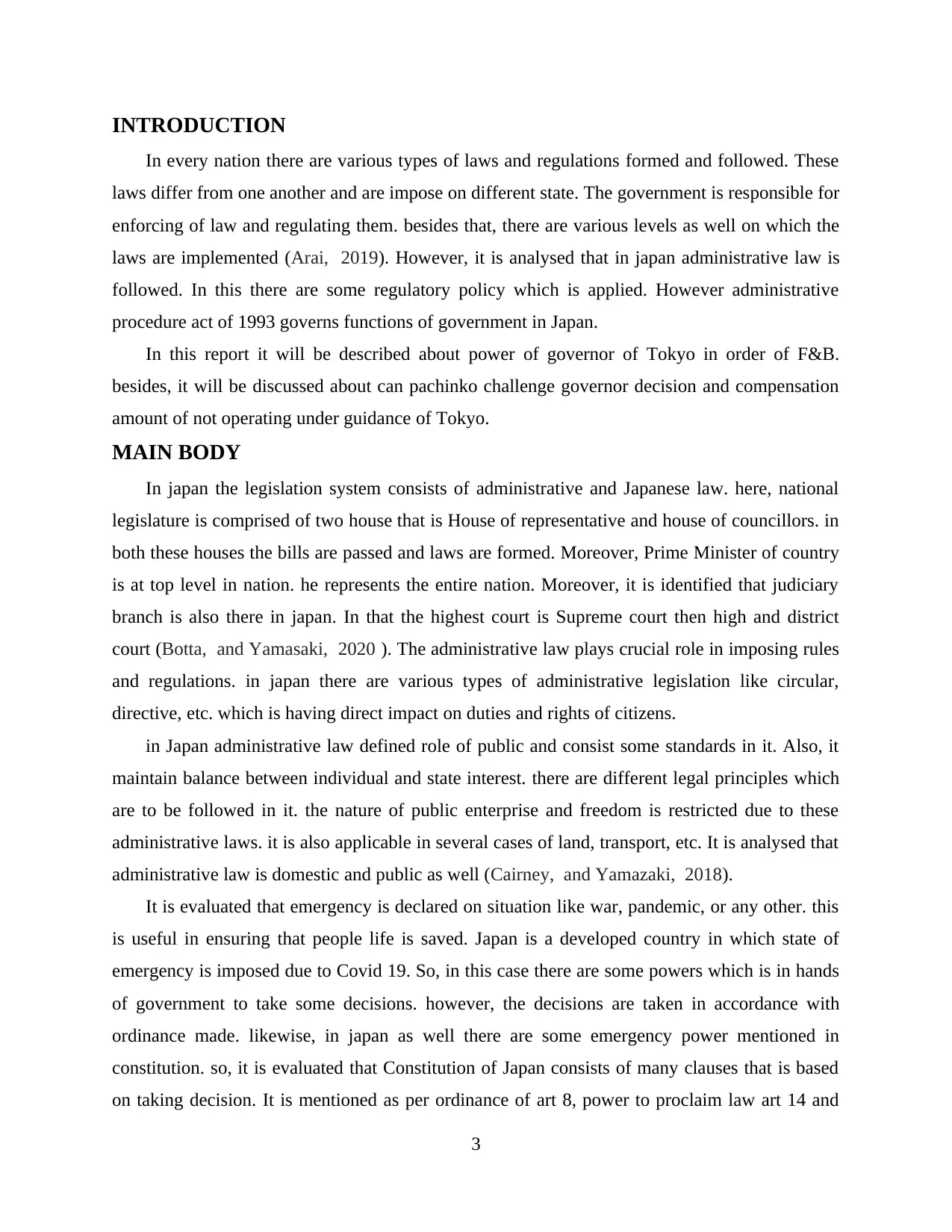
INTRODUCTION
In every nation there are various types of laws and regulations formed and followed. These
laws differ from one another and are impose on different state. The government is responsible for
enforcing of law and regulating them. besides that, there are various levels as well on which the
laws are implemented (Arai, 2019). However, it is analysed that in japan administrative law is
followed. In this there are some regulatory policy which is applied. However administrative
procedure act of 1993 governs functions of government in Japan.
In this report it will be described about power of governor of Tokyo in order of F&B.
besides, it will be discussed about can pachinko challenge governor decision and compensation
amount of not operating under guidance of Tokyo.
MAIN BODY
In japan the legislation system consists of administrative and Japanese law. here, national
legislature is comprised of two house that is House of representative and house of councillors. in
both these houses the bills are passed and laws are formed. Moreover, Prime Minister of country
is at top level in nation. he represents the entire nation. Moreover, it is identified that judiciary
branch is also there in japan. In that the highest court is Supreme court then high and district
court (Botta, and Yamasaki, 2020 ). The administrative law plays crucial role in imposing rules
and regulations. in japan there are various types of administrative legislation like circular,
directive, etc. which is having direct impact on duties and rights of citizens.
in Japan administrative law defined role of public and consist some standards in it. Also, it
maintain balance between individual and state interest. there are different legal principles which
are to be followed in it. the nature of public enterprise and freedom is restricted due to these
administrative laws. it is also applicable in several cases of land, transport, etc. It is analysed that
administrative law is domestic and public as well (Cairney, and Yamazaki, 2018).
It is evaluated that emergency is declared on situation like war, pandemic, or any other. this
is useful in ensuring that people life is saved. Japan is a developed country in which state of
emergency is imposed due to Covid 19. So, in this case there are some powers which is in hands
of government to take some decisions. however, the decisions are taken in accordance with
ordinance made. likewise, in japan as well there are some emergency power mentioned in
constitution. so, it is evaluated that Constitution of Japan consists of many clauses that is based
on taking decision. It is mentioned as per ordinance of art 8, power to proclaim law art 14 and
3
In every nation there are various types of laws and regulations formed and followed. These
laws differ from one another and are impose on different state. The government is responsible for
enforcing of law and regulating them. besides that, there are various levels as well on which the
laws are implemented (Arai, 2019). However, it is analysed that in japan administrative law is
followed. In this there are some regulatory policy which is applied. However administrative
procedure act of 1993 governs functions of government in Japan.
In this report it will be described about power of governor of Tokyo in order of F&B.
besides, it will be discussed about can pachinko challenge governor decision and compensation
amount of not operating under guidance of Tokyo.
MAIN BODY
In japan the legislation system consists of administrative and Japanese law. here, national
legislature is comprised of two house that is House of representative and house of councillors. in
both these houses the bills are passed and laws are formed. Moreover, Prime Minister of country
is at top level in nation. he represents the entire nation. Moreover, it is identified that judiciary
branch is also there in japan. In that the highest court is Supreme court then high and district
court (Botta, and Yamasaki, 2020 ). The administrative law plays crucial role in imposing rules
and regulations. in japan there are various types of administrative legislation like circular,
directive, etc. which is having direct impact on duties and rights of citizens.
in Japan administrative law defined role of public and consist some standards in it. Also, it
maintain balance between individual and state interest. there are different legal principles which
are to be followed in it. the nature of public enterprise and freedom is restricted due to these
administrative laws. it is also applicable in several cases of land, transport, etc. It is analysed that
administrative law is domestic and public as well (Cairney, and Yamazaki, 2018).
It is evaluated that emergency is declared on situation like war, pandemic, or any other. this
is useful in ensuring that people life is saved. Japan is a developed country in which state of
emergency is imposed due to Covid 19. So, in this case there are some powers which is in hands
of government to take some decisions. however, the decisions are taken in accordance with
ordinance made. likewise, in japan as well there are some emergency power mentioned in
constitution. so, it is evaluated that Constitution of Japan consists of many clauses that is based
on taking decision. It is mentioned as per ordinance of art 8, power to proclaim law art 14 and
3
⊘ This is a preview!⊘
Do you want full access?
Subscribe today to unlock all pages.

Trusted by 1+ million students worldwide
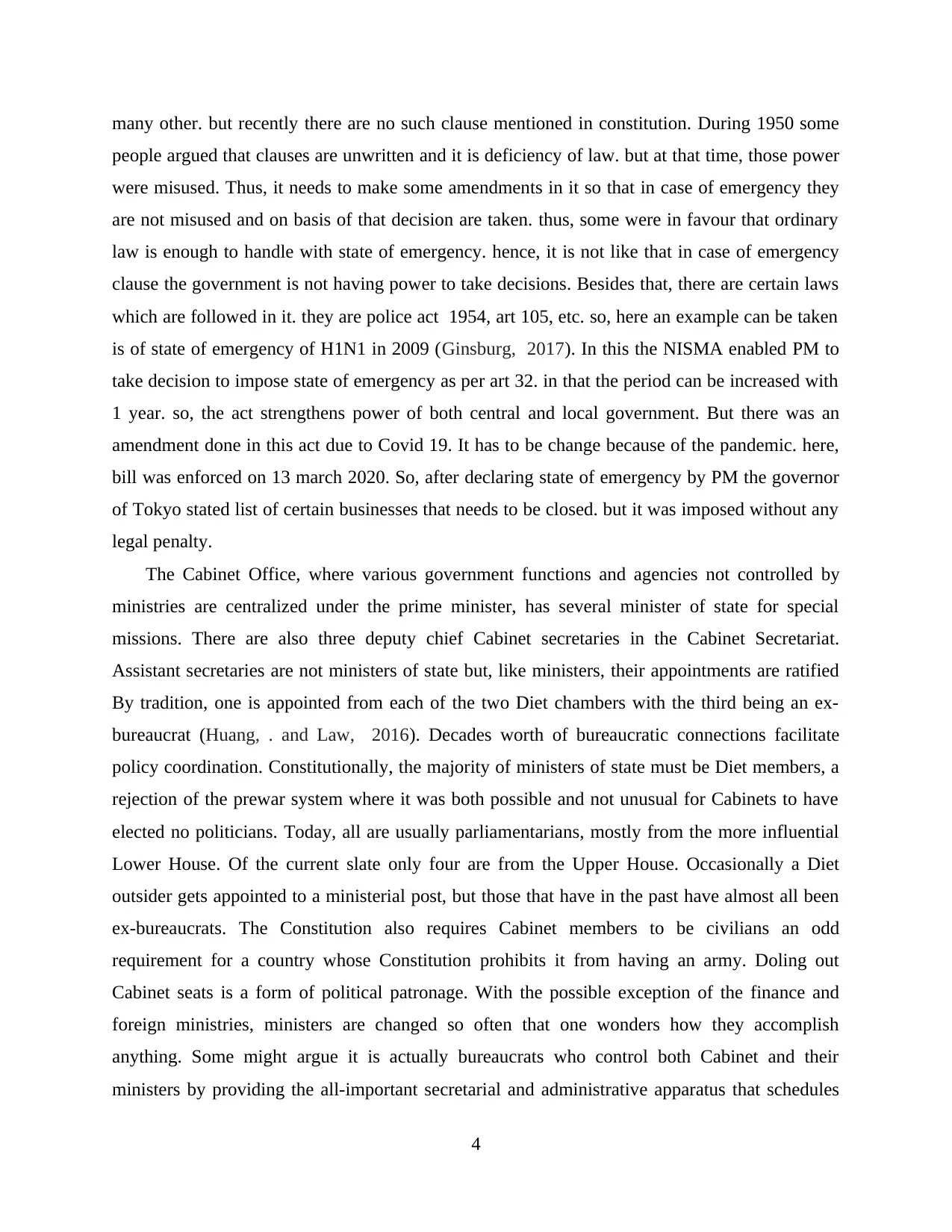
many other. but recently there are no such clause mentioned in constitution. During 1950 some
people argued that clauses are unwritten and it is deficiency of law. but at that time, those power
were misused. Thus, it needs to make some amendments in it so that in case of emergency they
are not misused and on basis of that decision are taken. thus, some were in favour that ordinary
law is enough to handle with state of emergency. hence, it is not like that in case of emergency
clause the government is not having power to take decisions. Besides that, there are certain laws
which are followed in it. they are police act 1954, art 105, etc. so, here an example can be taken
is of state of emergency of H1N1 in 2009 (Ginsburg, 2017). In this the NISMA enabled PM to
take decision to impose state of emergency as per art 32. in that the period can be increased with
1 year. so, the act strengthens power of both central and local government. But there was an
amendment done in this act due to Covid 19. It has to be change because of the pandemic. here,
bill was enforced on 13 march 2020. So, after declaring state of emergency by PM the governor
of Tokyo stated list of certain businesses that needs to be closed. but it was imposed without any
legal penalty.
The Cabinet Office, where various government functions and agencies not controlled by
ministries are centralized under the prime minister, has several minister of state for special
missions. There are also three deputy chief Cabinet secretaries in the Cabinet Secretariat.
Assistant secretaries are not ministers of state but, like ministers, their appointments are ratified
By tradition, one is appointed from each of the two Diet chambers with the third being an ex-
bureaucrat (Huang, . and Law, 2016). Decades worth of bureaucratic connections facilitate
policy coordination. Constitutionally, the majority of ministers of state must be Diet members, a
rejection of the prewar system where it was both possible and not unusual for Cabinets to have
elected no politicians. Today, all are usually parliamentarians, mostly from the more influential
Lower House. Of the current slate only four are from the Upper House. Occasionally a Diet
outsider gets appointed to a ministerial post, but those that have in the past have almost all been
ex-bureaucrats. The Constitution also requires Cabinet members to be civilians an odd
requirement for a country whose Constitution prohibits it from having an army. Doling out
Cabinet seats is a form of political patronage. With the possible exception of the finance and
foreign ministries, ministers are changed so often that one wonders how they accomplish
anything. Some might argue it is actually bureaucrats who control both Cabinet and their
ministers by providing the all-important secretarial and administrative apparatus that schedules
4
people argued that clauses are unwritten and it is deficiency of law. but at that time, those power
were misused. Thus, it needs to make some amendments in it so that in case of emergency they
are not misused and on basis of that decision are taken. thus, some were in favour that ordinary
law is enough to handle with state of emergency. hence, it is not like that in case of emergency
clause the government is not having power to take decisions. Besides that, there are certain laws
which are followed in it. they are police act 1954, art 105, etc. so, here an example can be taken
is of state of emergency of H1N1 in 2009 (Ginsburg, 2017). In this the NISMA enabled PM to
take decision to impose state of emergency as per art 32. in that the period can be increased with
1 year. so, the act strengthens power of both central and local government. But there was an
amendment done in this act due to Covid 19. It has to be change because of the pandemic. here,
bill was enforced on 13 march 2020. So, after declaring state of emergency by PM the governor
of Tokyo stated list of certain businesses that needs to be closed. but it was imposed without any
legal penalty.
The Cabinet Office, where various government functions and agencies not controlled by
ministries are centralized under the prime minister, has several minister of state for special
missions. There are also three deputy chief Cabinet secretaries in the Cabinet Secretariat.
Assistant secretaries are not ministers of state but, like ministers, their appointments are ratified
By tradition, one is appointed from each of the two Diet chambers with the third being an ex-
bureaucrat (Huang, . and Law, 2016). Decades worth of bureaucratic connections facilitate
policy coordination. Constitutionally, the majority of ministers of state must be Diet members, a
rejection of the prewar system where it was both possible and not unusual for Cabinets to have
elected no politicians. Today, all are usually parliamentarians, mostly from the more influential
Lower House. Of the current slate only four are from the Upper House. Occasionally a Diet
outsider gets appointed to a ministerial post, but those that have in the past have almost all been
ex-bureaucrats. The Constitution also requires Cabinet members to be civilians an odd
requirement for a country whose Constitution prohibits it from having an army. Doling out
Cabinet seats is a form of political patronage. With the possible exception of the finance and
foreign ministries, ministers are changed so often that one wonders how they accomplish
anything. Some might argue it is actually bureaucrats who control both Cabinet and their
ministers by providing the all-important secretarial and administrative apparatus that schedules
4
Paraphrase This Document
Need a fresh take? Get an instant paraphrase of this document with our AI Paraphraser
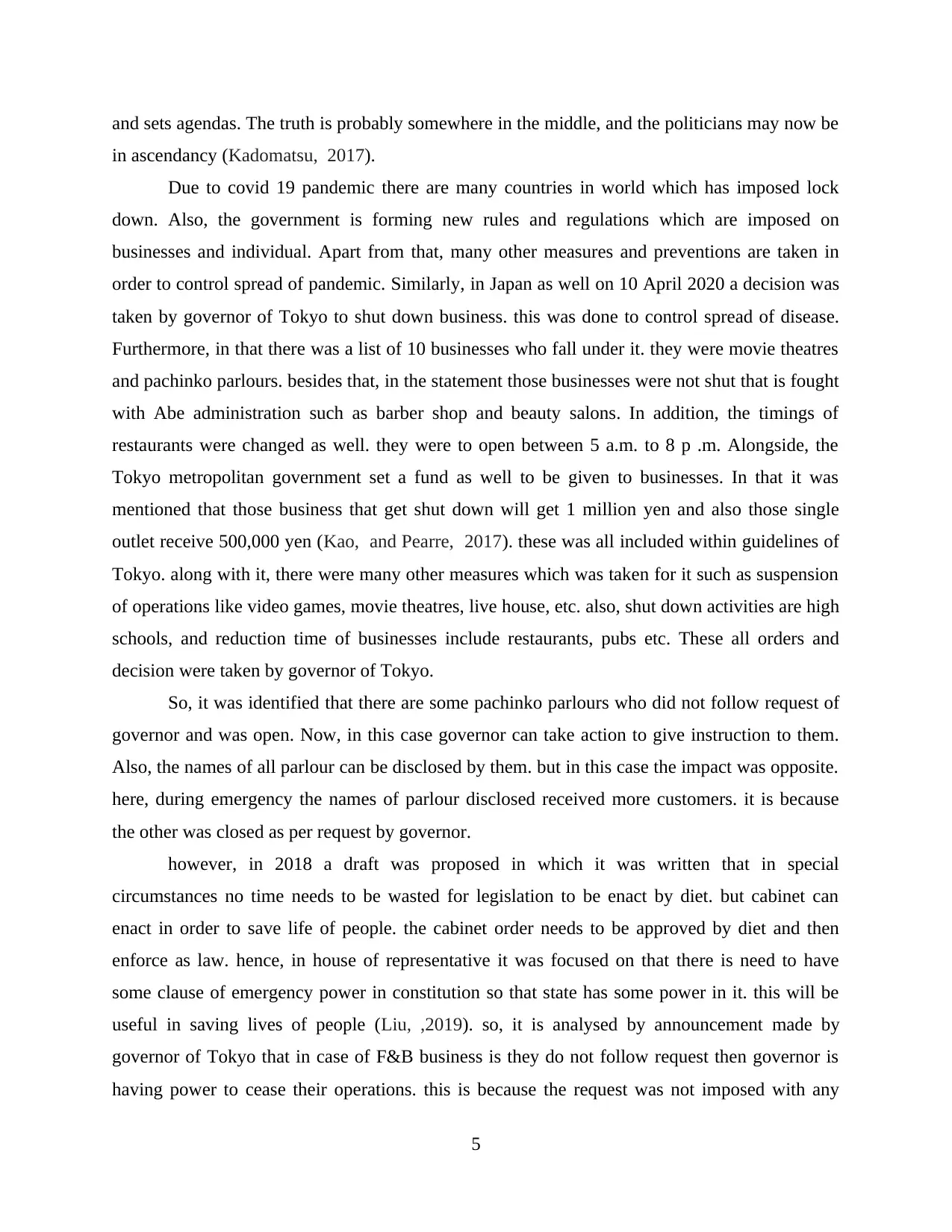
and sets agendas. The truth is probably somewhere in the middle, and the politicians may now be
in ascendancy (Kadomatsu, 2017).
Due to covid 19 pandemic there are many countries in world which has imposed lock
down. Also, the government is forming new rules and regulations which are imposed on
businesses and individual. Apart from that, many other measures and preventions are taken in
order to control spread of pandemic. Similarly, in Japan as well on 10 April 2020 a decision was
taken by governor of Tokyo to shut down business. this was done to control spread of disease.
Furthermore, in that there was a list of 10 businesses who fall under it. they were movie theatres
and pachinko parlours. besides that, in the statement those businesses were not shut that is fought
with Abe administration such as barber shop and beauty salons. In addition, the timings of
restaurants were changed as well. they were to open between 5 a.m. to 8 p .m. Alongside, the
Tokyo metropolitan government set a fund as well to be given to businesses. In that it was
mentioned that those business that get shut down will get 1 million yen and also those single
outlet receive 500,000 yen (Kao, and Pearre, 2017). these was all included within guidelines of
Tokyo. along with it, there were many other measures which was taken for it such as suspension
of operations like video games, movie theatres, live house, etc. also, shut down activities are high
schools, and reduction time of businesses include restaurants, pubs etc. These all orders and
decision were taken by governor of Tokyo.
So, it was identified that there are some pachinko parlours who did not follow request of
governor and was open. Now, in this case governor can take action to give instruction to them.
Also, the names of all parlour can be disclosed by them. but in this case the impact was opposite.
here, during emergency the names of parlour disclosed received more customers. it is because
the other was closed as per request by governor.
however, in 2018 a draft was proposed in which it was written that in special
circumstances no time needs to be wasted for legislation to be enact by diet. but cabinet can
enact in order to save life of people. the cabinet order needs to be approved by diet and then
enforce as law. hence, in house of representative it was focused on that there is need to have
some clause of emergency power in constitution so that state has some power in it. this will be
useful in saving lives of people (Liu, ,2019). so, it is analysed by announcement made by
governor of Tokyo that in case of F&B business is they do not follow request then governor is
having power to cease their operations. this is because the request was not imposed with any
5
in ascendancy (Kadomatsu, 2017).
Due to covid 19 pandemic there are many countries in world which has imposed lock
down. Also, the government is forming new rules and regulations which are imposed on
businesses and individual. Apart from that, many other measures and preventions are taken in
order to control spread of pandemic. Similarly, in Japan as well on 10 April 2020 a decision was
taken by governor of Tokyo to shut down business. this was done to control spread of disease.
Furthermore, in that there was a list of 10 businesses who fall under it. they were movie theatres
and pachinko parlours. besides that, in the statement those businesses were not shut that is fought
with Abe administration such as barber shop and beauty salons. In addition, the timings of
restaurants were changed as well. they were to open between 5 a.m. to 8 p .m. Alongside, the
Tokyo metropolitan government set a fund as well to be given to businesses. In that it was
mentioned that those business that get shut down will get 1 million yen and also those single
outlet receive 500,000 yen (Kao, and Pearre, 2017). these was all included within guidelines of
Tokyo. along with it, there were many other measures which was taken for it such as suspension
of operations like video games, movie theatres, live house, etc. also, shut down activities are high
schools, and reduction time of businesses include restaurants, pubs etc. These all orders and
decision were taken by governor of Tokyo.
So, it was identified that there are some pachinko parlours who did not follow request of
governor and was open. Now, in this case governor can take action to give instruction to them.
Also, the names of all parlour can be disclosed by them. but in this case the impact was opposite.
here, during emergency the names of parlour disclosed received more customers. it is because
the other was closed as per request by governor.
however, in 2018 a draft was proposed in which it was written that in special
circumstances no time needs to be wasted for legislation to be enact by diet. but cabinet can
enact in order to save life of people. the cabinet order needs to be approved by diet and then
enforce as law. hence, in house of representative it was focused on that there is need to have
some clause of emergency power in constitution so that state has some power in it. this will be
useful in saving lives of people (Liu, ,2019). so, it is analysed by announcement made by
governor of Tokyo that in case of F&B business is they do not follow request then governor is
having power to cease their operations. this is because the request was not imposed with any
5
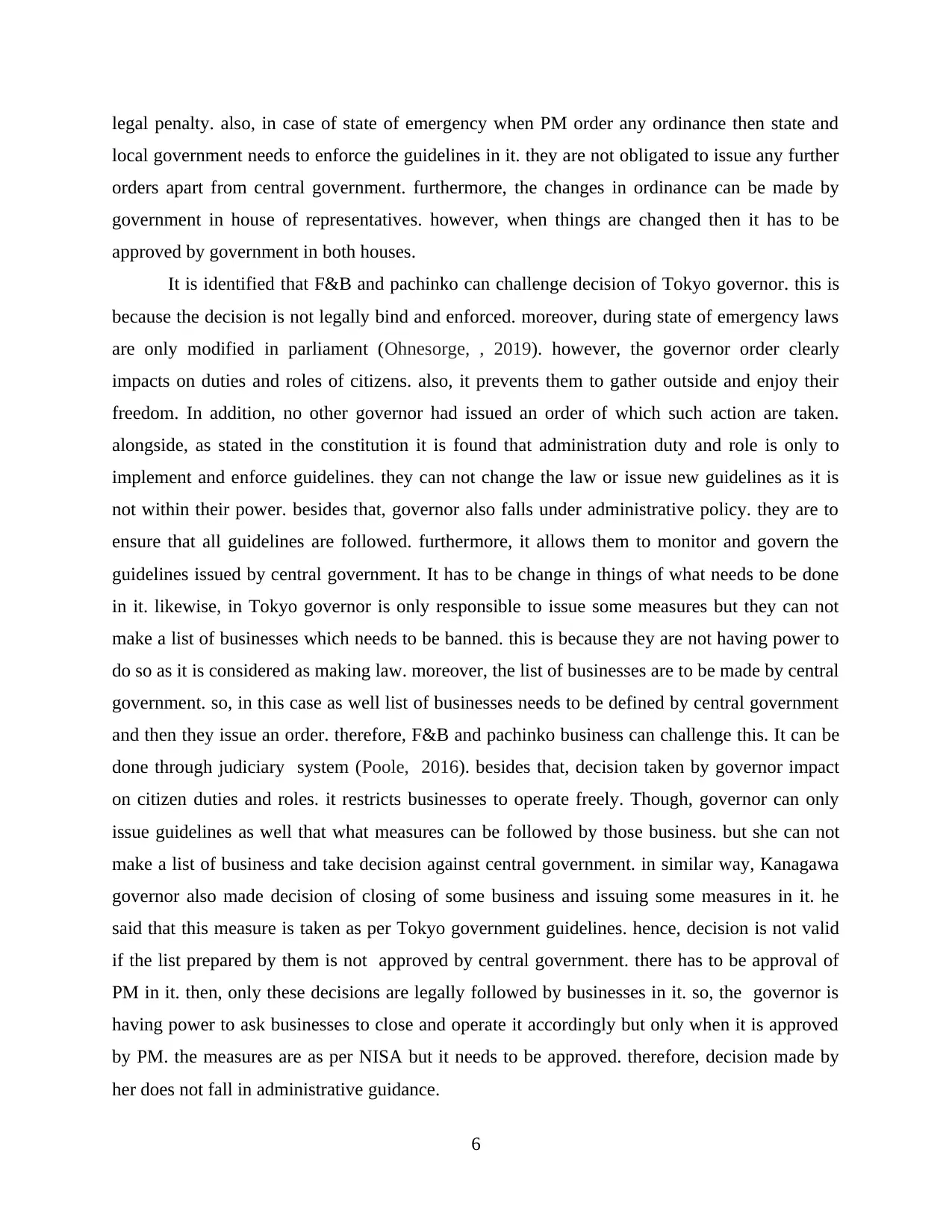
legal penalty. also, in case of state of emergency when PM order any ordinance then state and
local government needs to enforce the guidelines in it. they are not obligated to issue any further
orders apart from central government. furthermore, the changes in ordinance can be made by
government in house of representatives. however, when things are changed then it has to be
approved by government in both houses.
It is identified that F&B and pachinko can challenge decision of Tokyo governor. this is
because the decision is not legally bind and enforced. moreover, during state of emergency laws
are only modified in parliament (Ohnesorge, , 2019). however, the governor order clearly
impacts on duties and roles of citizens. also, it prevents them to gather outside and enjoy their
freedom. In addition, no other governor had issued an order of which such action are taken.
alongside, as stated in the constitution it is found that administration duty and role is only to
implement and enforce guidelines. they can not change the law or issue new guidelines as it is
not within their power. besides that, governor also falls under administrative policy. they are to
ensure that all guidelines are followed. furthermore, it allows them to monitor and govern the
guidelines issued by central government. It has to be change in things of what needs to be done
in it. likewise, in Tokyo governor is only responsible to issue some measures but they can not
make a list of businesses which needs to be banned. this is because they are not having power to
do so as it is considered as making law. moreover, the list of businesses are to be made by central
government. so, in this case as well list of businesses needs to be defined by central government
and then they issue an order. therefore, F&B and pachinko business can challenge this. It can be
done through judiciary system (Poole, 2016). besides that, decision taken by governor impact
on citizen duties and roles. it restricts businesses to operate freely. Though, governor can only
issue guidelines as well that what measures can be followed by those business. but she can not
make a list of business and take decision against central government. in similar way, Kanagawa
governor also made decision of closing of some business and issuing some measures in it. he
said that this measure is taken as per Tokyo government guidelines. hence, decision is not valid
if the list prepared by them is not approved by central government. there has to be approval of
PM in it. then, only these decisions are legally followed by businesses in it. so, the governor is
having power to ask businesses to close and operate it accordingly but only when it is approved
by PM. the measures are as per NISA but it needs to be approved. therefore, decision made by
her does not fall in administrative guidance.
6
local government needs to enforce the guidelines in it. they are not obligated to issue any further
orders apart from central government. furthermore, the changes in ordinance can be made by
government in house of representatives. however, when things are changed then it has to be
approved by government in both houses.
It is identified that F&B and pachinko can challenge decision of Tokyo governor. this is
because the decision is not legally bind and enforced. moreover, during state of emergency laws
are only modified in parliament (Ohnesorge, , 2019). however, the governor order clearly
impacts on duties and roles of citizens. also, it prevents them to gather outside and enjoy their
freedom. In addition, no other governor had issued an order of which such action are taken.
alongside, as stated in the constitution it is found that administration duty and role is only to
implement and enforce guidelines. they can not change the law or issue new guidelines as it is
not within their power. besides that, governor also falls under administrative policy. they are to
ensure that all guidelines are followed. furthermore, it allows them to monitor and govern the
guidelines issued by central government. It has to be change in things of what needs to be done
in it. likewise, in Tokyo governor is only responsible to issue some measures but they can not
make a list of businesses which needs to be banned. this is because they are not having power to
do so as it is considered as making law. moreover, the list of businesses are to be made by central
government. so, in this case as well list of businesses needs to be defined by central government
and then they issue an order. therefore, F&B and pachinko business can challenge this. It can be
done through judiciary system (Poole, 2016). besides that, decision taken by governor impact
on citizen duties and roles. it restricts businesses to operate freely. Though, governor can only
issue guidelines as well that what measures can be followed by those business. but she can not
make a list of business and take decision against central government. in similar way, Kanagawa
governor also made decision of closing of some business and issuing some measures in it. he
said that this measure is taken as per Tokyo government guidelines. hence, decision is not valid
if the list prepared by them is not approved by central government. there has to be approval of
PM in it. then, only these decisions are legally followed by businesses in it. so, the governor is
having power to ask businesses to close and operate it accordingly but only when it is approved
by PM. the measures are as per NISA but it needs to be approved. therefore, decision made by
her does not fall in administrative guidance.
6
⊘ This is a preview!⊘
Do you want full access?
Subscribe today to unlock all pages.

Trusted by 1+ million students worldwide
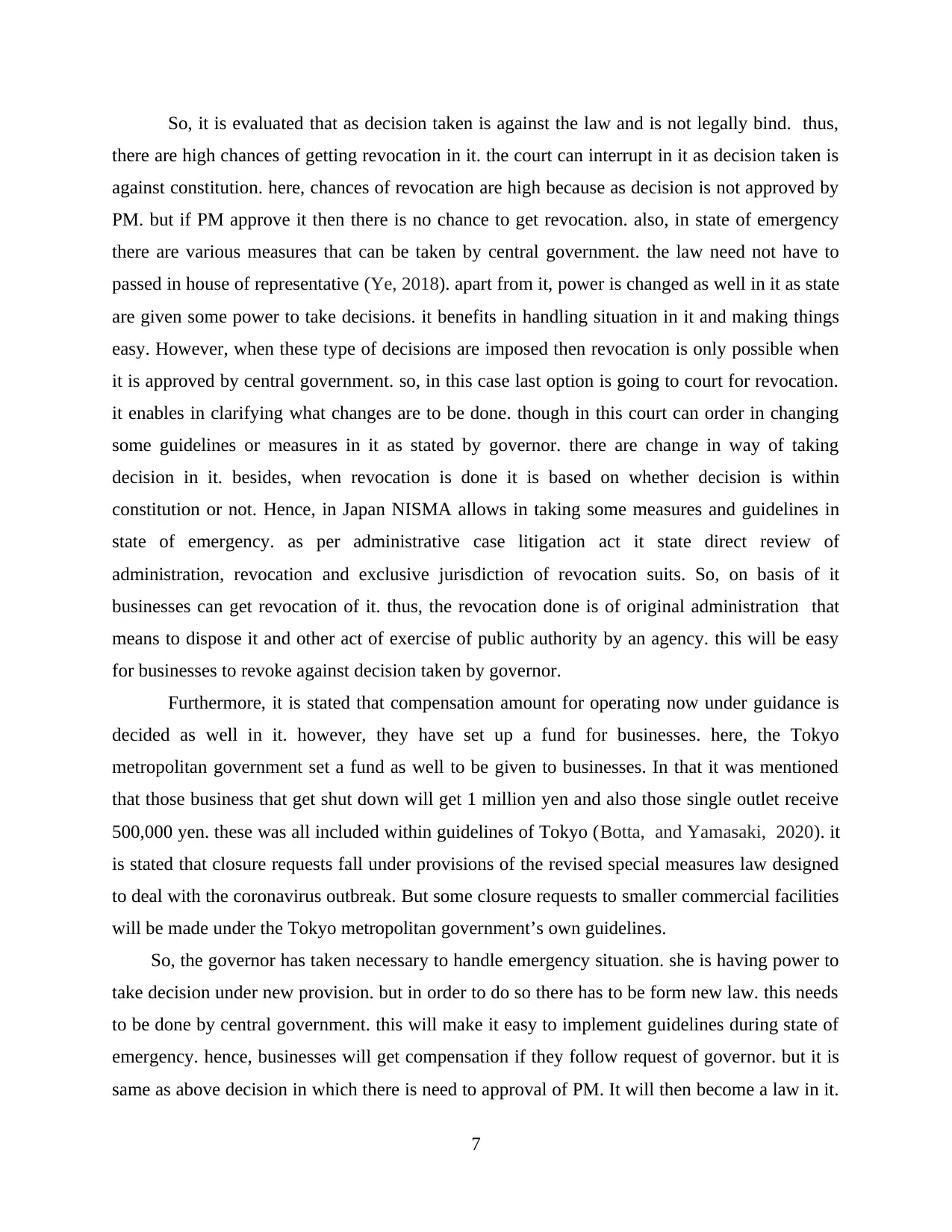
So, it is evaluated that as decision taken is against the law and is not legally bind. thus,
there are high chances of getting revocation in it. the court can interrupt in it as decision taken is
against constitution. here, chances of revocation are high because as decision is not approved by
PM. but if PM approve it then there is no chance to get revocation. also, in state of emergency
there are various measures that can be taken by central government. the law need not have to
passed in house of representative (Ye, 2018). apart from it, power is changed as well in it as state
are given some power to take decisions. it benefits in handling situation in it and making things
easy. However, when these type of decisions are imposed then revocation is only possible when
it is approved by central government. so, in this case last option is going to court for revocation.
it enables in clarifying what changes are to be done. though in this court can order in changing
some guidelines or measures in it as stated by governor. there are change in way of taking
decision in it. besides, when revocation is done it is based on whether decision is within
constitution or not. Hence, in Japan NISMA allows in taking some measures and guidelines in
state of emergency. as per administrative case litigation act it state direct review of
administration, revocation and exclusive jurisdiction of revocation suits. So, on basis of it
businesses can get revocation of it. thus, the revocation done is of original administration that
means to dispose it and other act of exercise of public authority by an agency. this will be easy
for businesses to revoke against decision taken by governor.
Furthermore, it is stated that compensation amount for operating now under guidance is
decided as well in it. however, they have set up a fund for businesses. here, the Tokyo
metropolitan government set a fund as well to be given to businesses. In that it was mentioned
that those business that get shut down will get 1 million yen and also those single outlet receive
500,000 yen. these was all included within guidelines of Tokyo (Botta, and Yamasaki, 2020). it
is stated that closure requests fall under provisions of the revised special measures law designed
to deal with the coronavirus outbreak. But some closure requests to smaller commercial facilities
will be made under the Tokyo metropolitan government’s own guidelines.
So, the governor has taken necessary to handle emergency situation. she is having power to
take decision under new provision. but in order to do so there has to be form new law. this needs
to be done by central government. this will make it easy to implement guidelines during state of
emergency. hence, businesses will get compensation if they follow request of governor. but it is
same as above decision in which there is need to approval of PM. It will then become a law in it.
7
there are high chances of getting revocation in it. the court can interrupt in it as decision taken is
against constitution. here, chances of revocation are high because as decision is not approved by
PM. but if PM approve it then there is no chance to get revocation. also, in state of emergency
there are various measures that can be taken by central government. the law need not have to
passed in house of representative (Ye, 2018). apart from it, power is changed as well in it as state
are given some power to take decisions. it benefits in handling situation in it and making things
easy. However, when these type of decisions are imposed then revocation is only possible when
it is approved by central government. so, in this case last option is going to court for revocation.
it enables in clarifying what changes are to be done. though in this court can order in changing
some guidelines or measures in it as stated by governor. there are change in way of taking
decision in it. besides, when revocation is done it is based on whether decision is within
constitution or not. Hence, in Japan NISMA allows in taking some measures and guidelines in
state of emergency. as per administrative case litigation act it state direct review of
administration, revocation and exclusive jurisdiction of revocation suits. So, on basis of it
businesses can get revocation of it. thus, the revocation done is of original administration that
means to dispose it and other act of exercise of public authority by an agency. this will be easy
for businesses to revoke against decision taken by governor.
Furthermore, it is stated that compensation amount for operating now under guidance is
decided as well in it. however, they have set up a fund for businesses. here, the Tokyo
metropolitan government set a fund as well to be given to businesses. In that it was mentioned
that those business that get shut down will get 1 million yen and also those single outlet receive
500,000 yen. these was all included within guidelines of Tokyo (Botta, and Yamasaki, 2020). it
is stated that closure requests fall under provisions of the revised special measures law designed
to deal with the coronavirus outbreak. But some closure requests to smaller commercial facilities
will be made under the Tokyo metropolitan government’s own guidelines.
So, the governor has taken necessary to handle emergency situation. she is having power to
take decision under new provision. but in order to do so there has to be form new law. this needs
to be done by central government. this will make it easy to implement guidelines during state of
emergency. hence, businesses will get compensation if they follow request of governor. but it is
same as above decision in which there is need to approval of PM. It will then become a law in it.
7
Paraphrase This Document
Need a fresh take? Get an instant paraphrase of this document with our AI Paraphraser
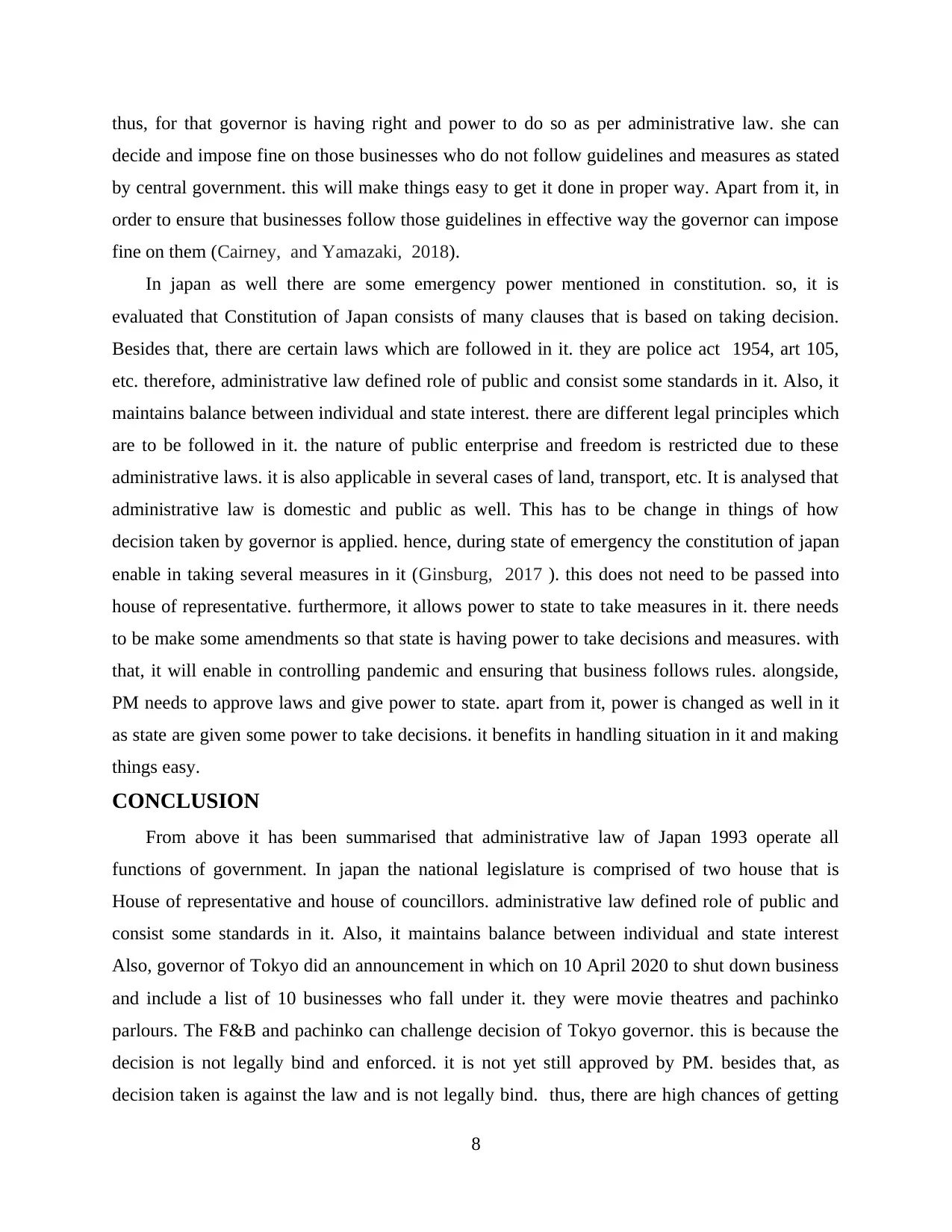
thus, for that governor is having right and power to do so as per administrative law. she can
decide and impose fine on those businesses who do not follow guidelines and measures as stated
by central government. this will make things easy to get it done in proper way. Apart from it, in
order to ensure that businesses follow those guidelines in effective way the governor can impose
fine on them (Cairney, and Yamazaki, 2018).
In japan as well there are some emergency power mentioned in constitution. so, it is
evaluated that Constitution of Japan consists of many clauses that is based on taking decision.
Besides that, there are certain laws which are followed in it. they are police act 1954, art 105,
etc. therefore, administrative law defined role of public and consist some standards in it. Also, it
maintains balance between individual and state interest. there are different legal principles which
are to be followed in it. the nature of public enterprise and freedom is restricted due to these
administrative laws. it is also applicable in several cases of land, transport, etc. It is analysed that
administrative law is domestic and public as well. This has to be change in things of how
decision taken by governor is applied. hence, during state of emergency the constitution of japan
enable in taking several measures in it (Ginsburg, 2017 ). this does not need to be passed into
house of representative. furthermore, it allows power to state to take measures in it. there needs
to be make some amendments so that state is having power to take decisions and measures. with
that, it will enable in controlling pandemic and ensuring that business follows rules. alongside,
PM needs to approve laws and give power to state. apart from it, power is changed as well in it
as state are given some power to take decisions. it benefits in handling situation in it and making
things easy.
CONCLUSION
From above it has been summarised that administrative law of Japan 1993 operate all
functions of government. In japan the national legislature is comprised of two house that is
House of representative and house of councillors. administrative law defined role of public and
consist some standards in it. Also, it maintains balance between individual and state interest
Also, governor of Tokyo did an announcement in which on 10 April 2020 to shut down business
and include a list of 10 businesses who fall under it. they were movie theatres and pachinko
parlours. The F&B and pachinko can challenge decision of Tokyo governor. this is because the
decision is not legally bind and enforced. it is not yet still approved by PM. besides that, as
decision taken is against the law and is not legally bind. thus, there are high chances of getting
8
decide and impose fine on those businesses who do not follow guidelines and measures as stated
by central government. this will make things easy to get it done in proper way. Apart from it, in
order to ensure that businesses follow those guidelines in effective way the governor can impose
fine on them (Cairney, and Yamazaki, 2018).
In japan as well there are some emergency power mentioned in constitution. so, it is
evaluated that Constitution of Japan consists of many clauses that is based on taking decision.
Besides that, there are certain laws which are followed in it. they are police act 1954, art 105,
etc. therefore, administrative law defined role of public and consist some standards in it. Also, it
maintains balance between individual and state interest. there are different legal principles which
are to be followed in it. the nature of public enterprise and freedom is restricted due to these
administrative laws. it is also applicable in several cases of land, transport, etc. It is analysed that
administrative law is domestic and public as well. This has to be change in things of how
decision taken by governor is applied. hence, during state of emergency the constitution of japan
enable in taking several measures in it (Ginsburg, 2017 ). this does not need to be passed into
house of representative. furthermore, it allows power to state to take measures in it. there needs
to be make some amendments so that state is having power to take decisions and measures. with
that, it will enable in controlling pandemic and ensuring that business follows rules. alongside,
PM needs to approve laws and give power to state. apart from it, power is changed as well in it
as state are given some power to take decisions. it benefits in handling situation in it and making
things easy.
CONCLUSION
From above it has been summarised that administrative law of Japan 1993 operate all
functions of government. In japan the national legislature is comprised of two house that is
House of representative and house of councillors. administrative law defined role of public and
consist some standards in it. Also, it maintains balance between individual and state interest
Also, governor of Tokyo did an announcement in which on 10 April 2020 to shut down business
and include a list of 10 businesses who fall under it. they were movie theatres and pachinko
parlours. The F&B and pachinko can challenge decision of Tokyo governor. this is because the
decision is not legally bind and enforced. it is not yet still approved by PM. besides that, as
decision taken is against the law and is not legally bind. thus, there are high chances of getting
8
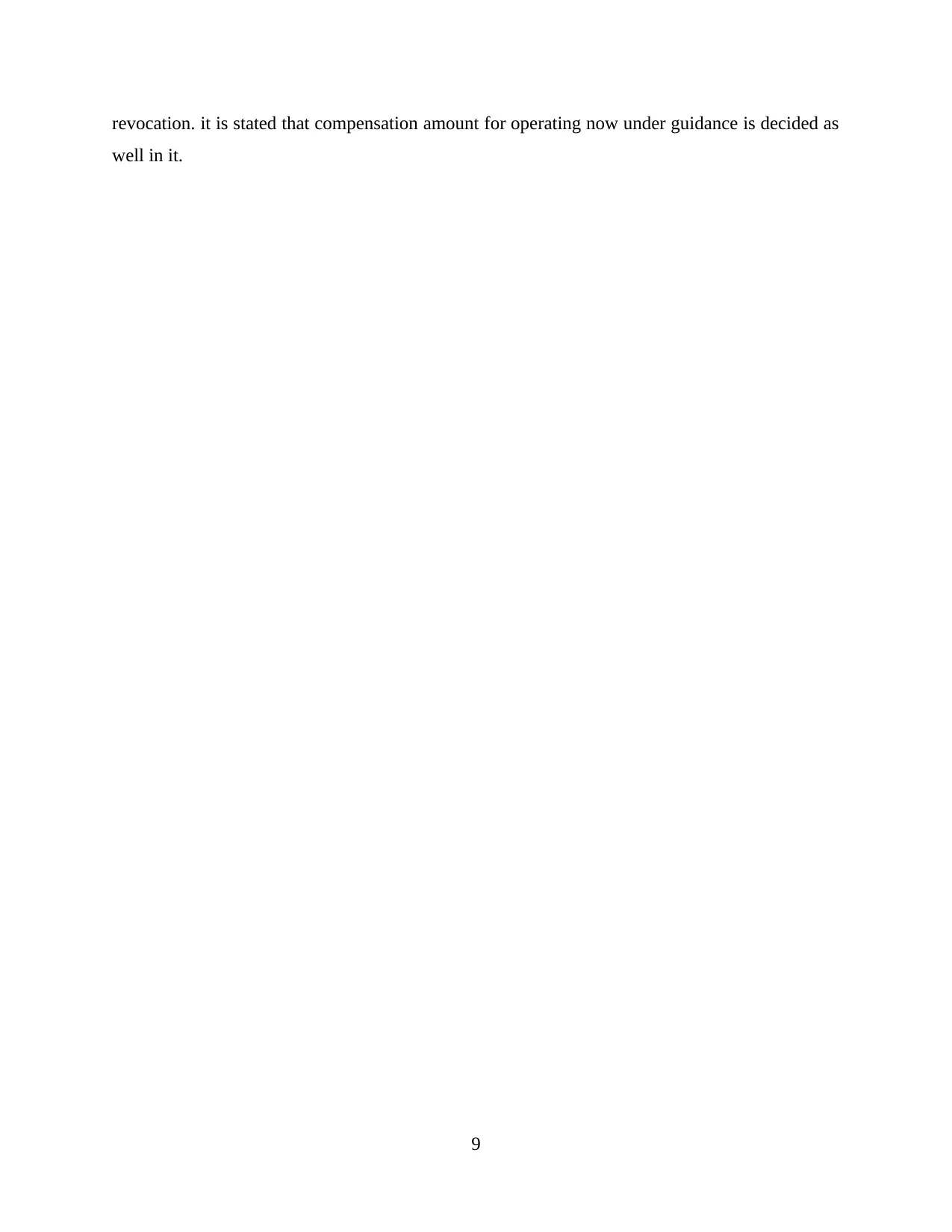
revocation. it is stated that compensation amount for operating now under guidance is decided as
well in it.
9
well in it.
9
⊘ This is a preview!⊘
Do you want full access?
Subscribe today to unlock all pages.

Trusted by 1+ million students worldwide
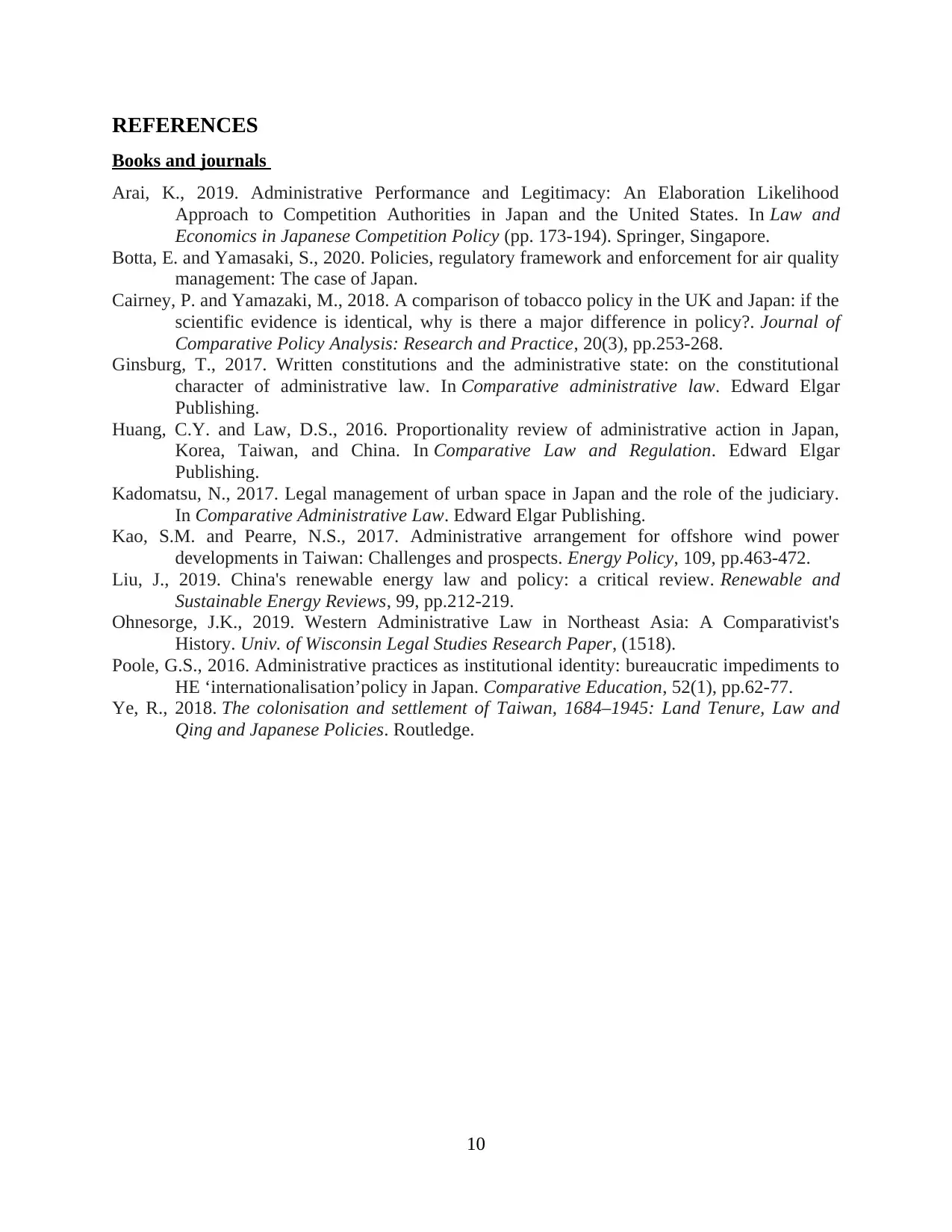
REFERENCES
Books and journals
Arai, K., 2019. Administrative Performance and Legitimacy: An Elaboration Likelihood
Approach to Competition Authorities in Japan and the United States. In Law and
Economics in Japanese Competition Policy (pp. 173-194). Springer, Singapore.
Botta, E. and Yamasaki, S., 2020. Policies, regulatory framework and enforcement for air quality
management: The case of Japan.
Cairney, P. and Yamazaki, M., 2018. A comparison of tobacco policy in the UK and Japan: if the
scientific evidence is identical, why is there a major difference in policy?. Journal of
Comparative Policy Analysis: Research and Practice, 20(3), pp.253-268.
Ginsburg, T., 2017. Written constitutions and the administrative state: on the constitutional
character of administrative law. In Comparative administrative law. Edward Elgar
Publishing.
Huang, C.Y. and Law, D.S., 2016. Proportionality review of administrative action in Japan,
Korea, Taiwan, and China. In Comparative Law and Regulation. Edward Elgar
Publishing.
Kadomatsu, N., 2017. Legal management of urban space in Japan and the role of the judiciary.
In Comparative Administrative Law. Edward Elgar Publishing.
Kao, S.M. and Pearre, N.S., 2017. Administrative arrangement for offshore wind power
developments in Taiwan: Challenges and prospects. Energy Policy, 109, pp.463-472.
Liu, J., 2019. China's renewable energy law and policy: a critical review. Renewable and
Sustainable Energy Reviews, 99, pp.212-219.
Ohnesorge, J.K., 2019. Western Administrative Law in Northeast Asia: A Comparativist's
History. Univ. of Wisconsin Legal Studies Research Paper, (1518).
Poole, G.S., 2016. Administrative practices as institutional identity: bureaucratic impediments to
HE ‘internationalisation’policy in Japan. Comparative Education, 52(1), pp.62-77.
Ye, R., 2018. The colonisation and settlement of Taiwan, 1684–1945: Land Tenure, Law and
Qing and Japanese Policies. Routledge.
10
Books and journals
Arai, K., 2019. Administrative Performance and Legitimacy: An Elaboration Likelihood
Approach to Competition Authorities in Japan and the United States. In Law and
Economics in Japanese Competition Policy (pp. 173-194). Springer, Singapore.
Botta, E. and Yamasaki, S., 2020. Policies, regulatory framework and enforcement for air quality
management: The case of Japan.
Cairney, P. and Yamazaki, M., 2018. A comparison of tobacco policy in the UK and Japan: if the
scientific evidence is identical, why is there a major difference in policy?. Journal of
Comparative Policy Analysis: Research and Practice, 20(3), pp.253-268.
Ginsburg, T., 2017. Written constitutions and the administrative state: on the constitutional
character of administrative law. In Comparative administrative law. Edward Elgar
Publishing.
Huang, C.Y. and Law, D.S., 2016. Proportionality review of administrative action in Japan,
Korea, Taiwan, and China. In Comparative Law and Regulation. Edward Elgar
Publishing.
Kadomatsu, N., 2017. Legal management of urban space in Japan and the role of the judiciary.
In Comparative Administrative Law. Edward Elgar Publishing.
Kao, S.M. and Pearre, N.S., 2017. Administrative arrangement for offshore wind power
developments in Taiwan: Challenges and prospects. Energy Policy, 109, pp.463-472.
Liu, J., 2019. China's renewable energy law and policy: a critical review. Renewable and
Sustainable Energy Reviews, 99, pp.212-219.
Ohnesorge, J.K., 2019. Western Administrative Law in Northeast Asia: A Comparativist's
History. Univ. of Wisconsin Legal Studies Research Paper, (1518).
Poole, G.S., 2016. Administrative practices as institutional identity: bureaucratic impediments to
HE ‘internationalisation’policy in Japan. Comparative Education, 52(1), pp.62-77.
Ye, R., 2018. The colonisation and settlement of Taiwan, 1684–1945: Land Tenure, Law and
Qing and Japanese Policies. Routledge.
10
1 out of 10
Related Documents
Your All-in-One AI-Powered Toolkit for Academic Success.
+13062052269
info@desklib.com
Available 24*7 on WhatsApp / Email
![[object Object]](/_next/static/media/star-bottom.7253800d.svg)
Unlock your academic potential
Copyright © 2020–2026 A2Z Services. All Rights Reserved. Developed and managed by ZUCOL.




